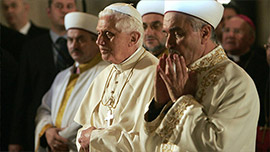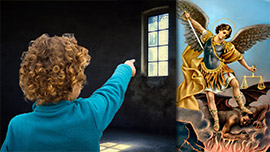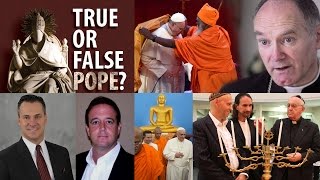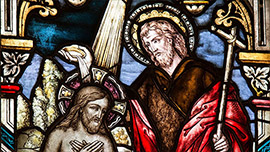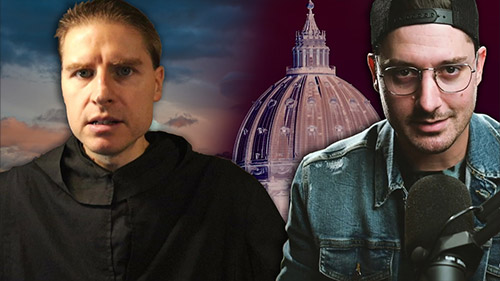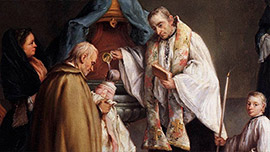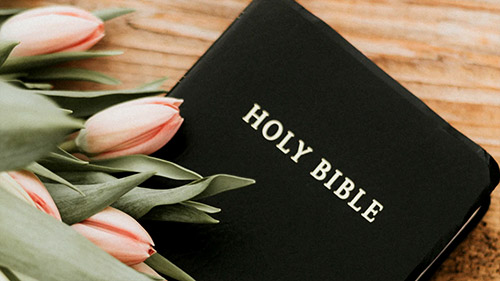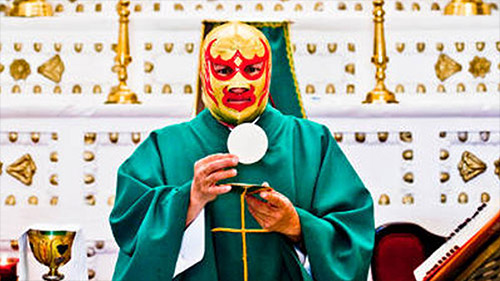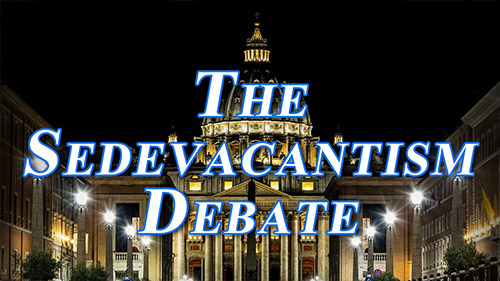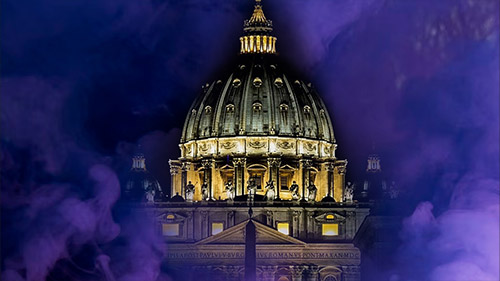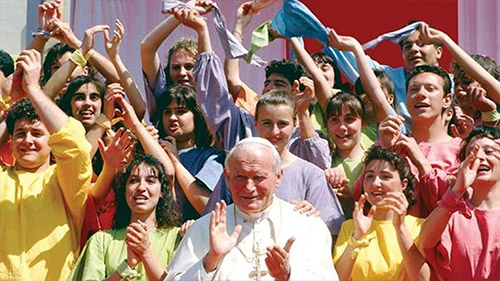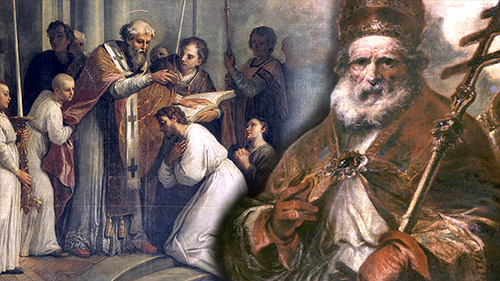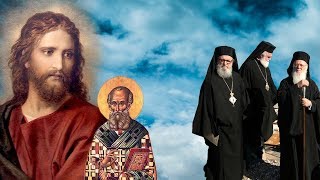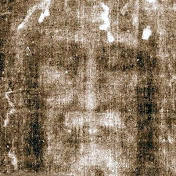 | vaticancatholic.com - English Channel |
Download Audio — File Size: 7.54 MB — Duration: 6:59 Faith & Doctrine | History | The Seven Sacraments | The True Popes Of The Catholic Church | Traditional Catholic Issues Bro. Peter Dimond In the year 563 a council was held at Braga (in modern Portugal). This council promulgated some interesting things about people who committed suicide, and about catechumens who died without baptism. To our knowledge, the chapters of this council (except for certain excerpts) have never been fully translated from Latin into English. We will present a translation of chapters 16 and 17 in this video. After citing the chapters, we will show that this Council had papal approval and make a few other points. This is the Latin text (with an English translation) of Chapter 16 of the 563 Council of Braga, concerning those who committed suicide. Note that some sources call the 563 Council the First Council of Braga; others consider it to be the Second Council of Braga, depending upon whether a Council in Braga in the 5th century is considered authentic.
Since suicide is a mortal sin that sends one to Hell, those who have tragically committed suicide are not to be given Catholic rites or ecclesiastical burial. They are also not to be prayed for. That’s the Tradition of the Church, but that is of course widely violated in the Vatican II Counter Church. The Vatican II Sect grants ‘Christian burial’ to (and offers ‘Masses’ for) all kinds of deceased notorious sinners and public heretics. As just one example, the ‘Diocese’ of Scranton offered a “Mass of Remembrance for People who have Die by Suicide” (https://www.dioceseofscranton.org/mass-for-suicide-healing-remembrance-to-be-held-sept-17-in-scranton/) In fact, the contrast between the Catholic Church’s teaching and tradition on refusing Catholic rites and Christian burial for grave sinners, and what the Vatican II Sect does on a regular basis, is striking. The Vatican II Sect’s departure from Catholic teaching and tradition in this area by itself proves that it’s not the Catholic Church. It is, rather, the prophesied end-times Counter Church, as our material explains. Here’s the Latin text (and an English translation) of chapter 17 of the Council of Braga, with regard to catechumens who died without baptism.
So, here we have the “dreaded Feeneyism” in the 563 Council of Braga. This decree clearly contradicts the idea of ‘baptism of desire.’ It specifically forbids Catholic rites for catechumens who die without baptism. Why? Because they were not considered part of the Church or among the faithful, and there’s no salvation outside the Church. One only becomes part of the Catholic Church through the reception of the Sacrament of Baptism. See: Subjection To The Roman Pontiff & The Necessity Of Baptism
Thus, catechumens who died without baptism were not given Catholic rites, just as Catholic rites were forbidden for suicides. Now, certain John 3:5 mockers have literally mocked the Council of Braga by trying to portray it as a little, insignificant council at which only eight bishops were present. I want to make a few points in response to that. First, it was an important provincial council, and one of the eight bishops in attendance was St. Martin of Braga. Second, as we’ve mentioned in the past, the council’s decree on unbaptized catechumens (which we just cited) is referenced by the Catholic Encyclopedia as reflective of the Tradition of the Church on this matter. However, there’s an even more important expression of this law and tradition, as we will see. Third, as probably few or none of the John 3:5 mockers know, this council received papal approval. In his epistle to Kings Alphonso VI and Sancho IV, dated March 19, 1074, Pope St. Gregory VII (one of the greatest and strongest popes in Catholic history) stated this about the 563 Council of Braga (which we just quoted from).
As we can see, Pope St. Gregory VII held that the 563 Council of Braga was authoritative. Now, an even more important expression of the aforementioned Tradition – namely, that all those who died without baptism were not to be given Catholic rites or a Catholic burial – is found in the Church’s law which states:
This law was articulated by various popes, including Pope St. Leo the Great and Pope St. Gregory VII, and it was incorporated into medieval canon law. We’ve cited it before. See our video: No Latin Mass Or Prayers For Dead Non-Catholics – Papal Teaching. Since the unbaptized (including unbaptized catechumens) were not in communion with the Church during life, you are not permitted to treat them as in communion with the Church after they die. Hence, they are not to be given Christian burial or prayed for. The same of course applies to all who die outside the Catholic Church.
That’s the authoritative and traditional law of the Church approved by various popes. It’s just more proof that we are correct on baptism and salvation, and that the John 3:5 mockers are wrong.
It’s also more proof that we are correct that you are not permitted to pray for deceased non-Catholics. Now, the aforementioned law of the Church (which is not purely disciplinary, but is connected with faith and the divine law) was compromised in the 20th century when modernism and errors were abounding, especially on salvation. A novelty was introduced in the 20th century – not as binding upon all in the Church, but as applicable to a certain segment of the Church – a novelty that contradicts the aforementioned authoritative law of the popes and the Tradition (as we see in Braga). So, is it possible for a bad law to be approved by a pope for a certain segment of the Church, or for certain people in the Church?
While the Church is spotless in her sacred laws imposed upon all, as Pius XII taught in Mystici Corporis, error can be found in laws that are not promulgated as binding upon all in the Church but are approved only for certain people in the Church, or for a certain segment of the Church.
We’ve proven this before, but there are additional facts and details on this matter that we plan to cover.
These facts will further totally refute the John 3:5 mockers. They have an inaccurate and overly broad view of the Church’s infallibility, while ironically those same people reject the most solemn pronouncements from the Chair of St. Peter on baptism and salvation.
We will further refute their misconceptions on this matter, God willing, in a future video.
The Council of Trent, Session 5, Canon 4, On Original Sin, ex cathedra:
Copyright © 2023 Most Holy Family Monastery |
On Suicides & Catechumens (The Council of Braga – Translated)
September 5, 2023
SHOW MORE


